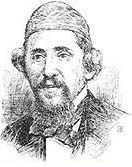Jacob ben Joseph Harofe
Jacob ben Joseph Harofe (Hebrew: יעקב בן יוסף הרופא, Ya'aqov ben Yosef the Doctor) (c. 1780[1] – October 2, 1851[2]), also known as Yaakov bar Yosef, was a 19th-century Talmudic scholar and dayan (rabbinic court judge) in Baghdad, Iraq. He was considered one of the greatest Torah scholars of his generation.[3] He authored many Torah novellae, homiletics, and commentaries. His most notable disciple was Hakham Abdallah Somekh.[2]
Biography
[edit]
Few biographical details are known about him. He studied under Rabbis Moshe Hayyim, Reuven Nawi, and Nissim Mashliah.[2]
In 1848 he was visited by the Romanian-Jewish traveler Benjamin II, who called him: "Highly respected, by virtue of his fine qualities and broad knowledge".[2]
He died in a cholera epidemic on October 2, 1851.[2] He was buried in the courtyard of the tomb of Joshua the High Priest in Baghdad.[4]
His son, Joseph, also became a Talmudic scholar; he died on October 21, 1877.[2] A daughter, Esther, married Rabbi Moshe Hayim Shlomo David Shamash, who later became the chief rabbi of the Iraqi community.
Selected bibliography
[edit]- Prayer Book for Sabbath with a commentary on Canticles[5]
- Shir Hadash (commentary on the Song of Songs)[2]
- Nava Tehilla[6]
- Shemen Hatov (on Maseches Beitza)[7]
References
[edit]- ^ "Manuscript – Homiletics on the Torah by Rabbi Ya'akov HaRofeh". Kedem Auction House Ltd. Archived from the original on 16 February 2018. Retrieved 16 February 2018.
- ^ a b c d e f g Zohar, Zvi (2010). "Jacob ben Joseph ha-Rofeh". In Stillman, Norman A. (ed.). Encyclopedia of Jews in the Islamic World. Brill Online.
- ^ Zohar, Zvi (2013). Rabbinic Creativity in the Modern Middle East. A&C Black. p. 13. ISBN 978-1472511508.
- ^ "Joshua (not Joshua ibn Nun) the High Priest Courtyard". Iraqi Jews (Babylonian Jews). Archived from the original on 28 June 2021. Retrieved 16 February 2018.
- ^ Sassoon, David S. "Review of Thesaurus of Mediæval Hebrew Poetry by Israel Davidson" The Jewish Quarterly Review, Vol. 21, No. 1/2 (Jul. - Oct., 1930), pp. 89-150
- ^ נאוה תהילה [Nava Tehilla] (in Hebrew). Otzar HaChokhma.
- ^ "שמן הטוב" [Shemen Hatov] (in Hebrew). Otzar HaChokhma.
